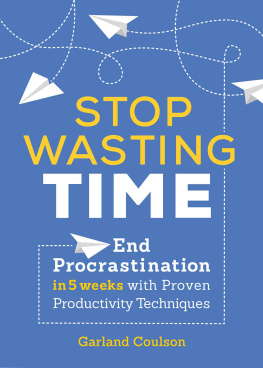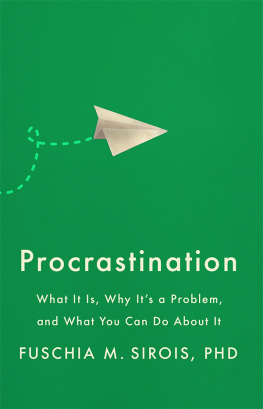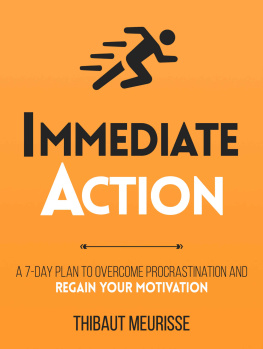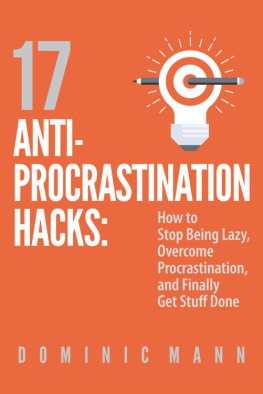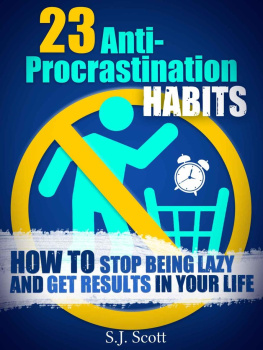Procrastination
How to Stop Being Lazy With Easy Anti-Procrastination Habits and Hacks to Overcome Procrastination Permanently and Be More Productive Every Day
Scott Stevenson
Legal notice
This book is copyright (c) 2017 by Scott Stevenson. All rights are reserved. This book may not be duplicated or copied, either in whole or in part, via any means including any electronic form of duplication such as recording or transcription. The contents of this book may not be transmitted, stored in any retrieval system, or copied in any other manner regardless of whether use is public or private without express prior permission of the publisher.
This book provides information only. The author does not offer any specific advice, including medical advice, nor does the author suggest the reader or any other person engage in any particular course of conduct in any specific situation. This book is not intended to be used as a substitute for any professional advice, medical or of any other variety. The reader accepts sole responsibility for how he or she uses the information contained in this book. Under no circumstances will the publisher or the author be held liable for damages of any kind arising either directly or indirectly from any information contained in this book.
Table of Contents
Introduction
Victor Hugo is one of Frances best-known writers, and hes also one of the greatest. He produced several classics, such as The Hunchback of Notre Dame and Les Misrables . His accomplishments were so great that his portrait has been placed on a French banknote. With honors like these, you would expect that he was incredibly productive and motivated all the time and never procrastinated a day in his life. Youre not the only one to think that, but you couldnt be more wrong.
The man we know today as a great French novelist was an incredible procrastinator, and sometimes he suffered for it. For example, in late 1829 he and his publisher came to an agreement: he would write The Hunchback of Notre Dame . However, he spent the next year doing everything possible to avoid actually sitting down and writing: he found other projects, he hosted guests, and he partied his time away.
Soon his publisher ran out of patience, and to get him going they assigned him a deadline: February of 1831. This gave Hugo less than six months to finish his book. Despite this, he spent some more time procrastinating before he figured out how to stop himself. He took off all of his clothes and had his servants hide them for hours at a time so that he wouldnt be able to leave the house. Trapped indoors with nothing else to do, Hugo finally wrote the book. He stayed in his study and wrote so much so quickly that the book was published two weeks ahead of schedule.
It may sound crazy, but hes not the only writer who had to find extreme ways to beat their procrastination. Moby Dick is currently considered one of the most incredible works of fiction ever, but Herman Melville was only able to finish it by having his wife chain him to his desk. Frank Lloyd Wright is another example of a procrastinator. He was a famous American architect, and he was hired by a wealthy Pittsburgh businessman in 1934. The businessman, Edgar Kaufman Sr, wanted a house built in rural Pennsylvania. In November, Wright met his employer there to look at the site, and the architect assured the businessman that he had already drawn up plans for a beautiful house. In reality, Wright had done absolutely nothing.
When Kaufman announced a surprise visit to see the design on a September Sunday in 1935, Wright was surprised. It took his employer two hours to drive to his house from Pittsburgh, and in that time Wright managed to both finish his breakfast (much to the concern of his onlooking apprentices) and design Fallingwater. In 1966 the house was listed as a National Historical Landmark, and the Smithsonian Institution says it is one of the 28 places people should see before they die. Clearly, procrastination is not a new problem. In fact, it has been plaguing the human race for thousands of years.
Even in Ancient Greece, an orator named Demosthenes was known for shaving half of his head when he had work to do. This forced him to stay inside to avoid ridicule, and this was when he practiced his speeches - pretty similar to what Hugo did when he hid his clothing. Despite the fact that procrastination has obviously been a big issue for a while, it can be conquered. Better yet, there are ways to do it without shaving your head or chaining yourself to your desk.
Procrastination has been a source of frustration for a long time. It can prevent people from reaching their goals. It can cause anxiety, stress, and an unhappy combination of guilt and self-loathing. It prevents people from reaching their maximum potential. However, it is possible to overcome it, and thats what youll learn about here. As you read, youll find a collection of methods and techniques that will help you overcome procrastination and finally get things done. Lets get started and start achieving your goals.
The Basics of Procrastination
Many people believe that they work better under deadline pressure, or maybe they think that its easier to complete a task later. Weve all used a version of these excuses at some point in our lives. Procrastination is simply defined as the act of putting off important tasks and doing the less important or more entertaining ones first.
When you procrastinate a task you push it closer to the deadline, but it doesnt only happen with difficult chores. Sometimes the task youre putting off isnt stressful, but you just feel like the time isnt right yet. People postpone college, doing dishes, having kids, getting married - its possible with literally anything. Despite the wide range of activities that can be procrastinated, they can all be classified by the following behavioral criteria. Procrastination is:
- Counterproductive
- Needless
- Delaying
However, just because you decide to hold off on something doesnt mean youre procrastinating. Procrastination only occurs when there is no good reason to avoid the task, and we all do it to some degree. However, some people reach the level of chronic procrastination, which is when it begins to interfere with your normal activities.
Chronic procrastination is the quick path to failure. It makes tasks seem more difficult than they are, it makes them harder to complete, and ultimately it can impact your success in life. Why would you ever want that for yourself? When asked why they procrastinate, chronic procrastinators said it was more of a lifestyle and a way to justify their inability to get tasks done quickly. According to research, 20% of American adults are chronic procrastinators - thats more than the diagnosed cases of chronic depression.
We started earlier that everybody procrastinates, but not everybody does it to the point of being a chronic procrastinator. Maybe you procrastinate and file your income taxes late, or hit snooze on your morning alarm even though you know youre going to be rushed and hectic once you do get up. Generally, people do not realize that their normal procrastination has become chronic procrastination until it is too late. Chronic procrastination can wreak havoc in your life, and were going to take a look at some interesting facts that will help you be more aware of your habits. Hopefully, if youre slipping into chronic procrastination, you can do something about it.
About Procrastination
Many chronic procrastinators are able to convince themselves that its simply a time management issue, which isnt the reality of the situation. Procrastinators are fully aware of time and able to manage it effectively, but they just choose not to. For example, you set your alarm for a certain time because you know how long it takes you to get ready and get to work on time. Every time you hit snooze, you are choosing to ignore that - maybe youve decided to skip breakfast instead, or simply tell your boss that your car wouldnt start. You are well aware of the time, you just choose to ignore the logical way of handling it. This falsely labeled time mismanagement often impacts many aspects of life. For example, you might put off doing income tax returns even though you know youll be stressed and anxious when you have to do it last minute.








